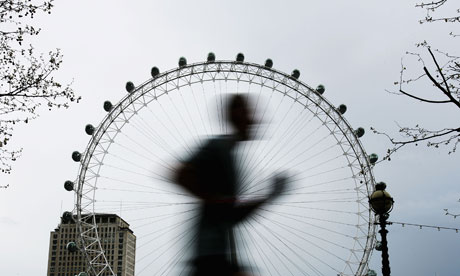
This morning, possibly as you read this review with a coffee and a pastry, nearly 40,000 men, women and costumed rhinos are lining up in Blackheath to race 26.2 miles across the capital. There is a good chance you will know, or have been arm-twisted to sponsor, one of the competitors – a fact that would have been unimaginable to the organisers of the first London Marathon 30 years ago. Running has long gone mainstream, and the preparation, equipment and expectations have been refined to the point that only a tiny fraction of today's starters, perhaps 500 runners, will fail to make it round the course to Buckingham Palace.
This popularity has severely devalued the marathon's currency. Even 10 years ago, you could have held a room spellbound with your impossible tales of endurance and adversity; now it is the anecdotal equivalent of knowing how to juggle. Hence the rise of the ultra-distance runner. For these hardy individuals, 26 miles is literally a preamble, a point to change their shirt and stock up on fruit pastilles and goji berries before it gets serious. Think of the running novice Eddie Izzard completing 43 marathons in 51 days for Sport Relief in 2009, or the American Dean Karnazes, who ran 50 marathons in 50 states on 50 consecutive days and was ranked 27th in Time magazine's 100 most influential people in 2007.
Robin Harvie is a fully signed-up nipple-bleeding, toenail-popping ultra-distance runner, but his story starts accessibly and aspirationally enough. Never a natural athlete, he decided to run the London Marathon in 2000, when he was in his early 20s. His first training session ended with him coughing and spluttering after a mile and walking back home. But he completed the marathon, ran some others and started to wonder what would happen if he just kept running.
One particular race caught his imagination: the Spartathlon, a 153-mile overnight trail run from Athens to Sparta that traces the original path of the Athenian messenger Pheidippides in 490BC as he sought help against the Persians in the Battle of Marathon. It attracts the best ultra-distance athletes in the world, fewer than 30% of whom finish. Part of the appeal for Harvie was the exclusivity, a dinner-party one-upmanship: "I wanted to see whether I could take on something that no one I knew had ever done," he admits. But, as his training intensified to the point where he was doing little but run, sleep and eat, he started to realise a more elemental change was taking place. As Harvie confronts his family's past and traces his own shift into adulthood, Why We Run becomes a paean to the transformative effect of pushing your body way beyond your imagined limits.
Many of us enjoy the head-clearing effects of pounding the pavements. But Harvie's contention is much stronger, almost evangelical: a gentle jog, or even a marathon, barely scratches the surface of human potential; if we want transcendental rewards – including "an increased hypersensitivity of body and mind" and a "heightened sense of moral being" – then we need to physically destroy ourselves and learn from the experience.
There is much to enjoy in this erudite, literary memoir, particularly Harvie's gruesome account of the Spartathlon, but it is hard not to be wary of anyone who claims so unblushingly to have found "the answer". In the end, you have some sympathy with his long-neglected wife when she tells him: "You want to do something extraordinary. I see that. But just once, then enough. We have a life to get on with, and I don't want to do that alone."

